Impact of Sugar Consumption on Immune Function and Disease
VerifiedAdded on 2023/06/12
|12
|3321
|197
AI Summary
This report discusses the impact of sugar consumption on immune function and disease, and critiques current evidence related to the research question in terms of methodology. It also highlights the importance of the research question in the context of the growing public health concerns of obesity and diabetes worldwide.
Contribute Materials
Your contribution can guide someone’s learning journey. Share your
documents today.
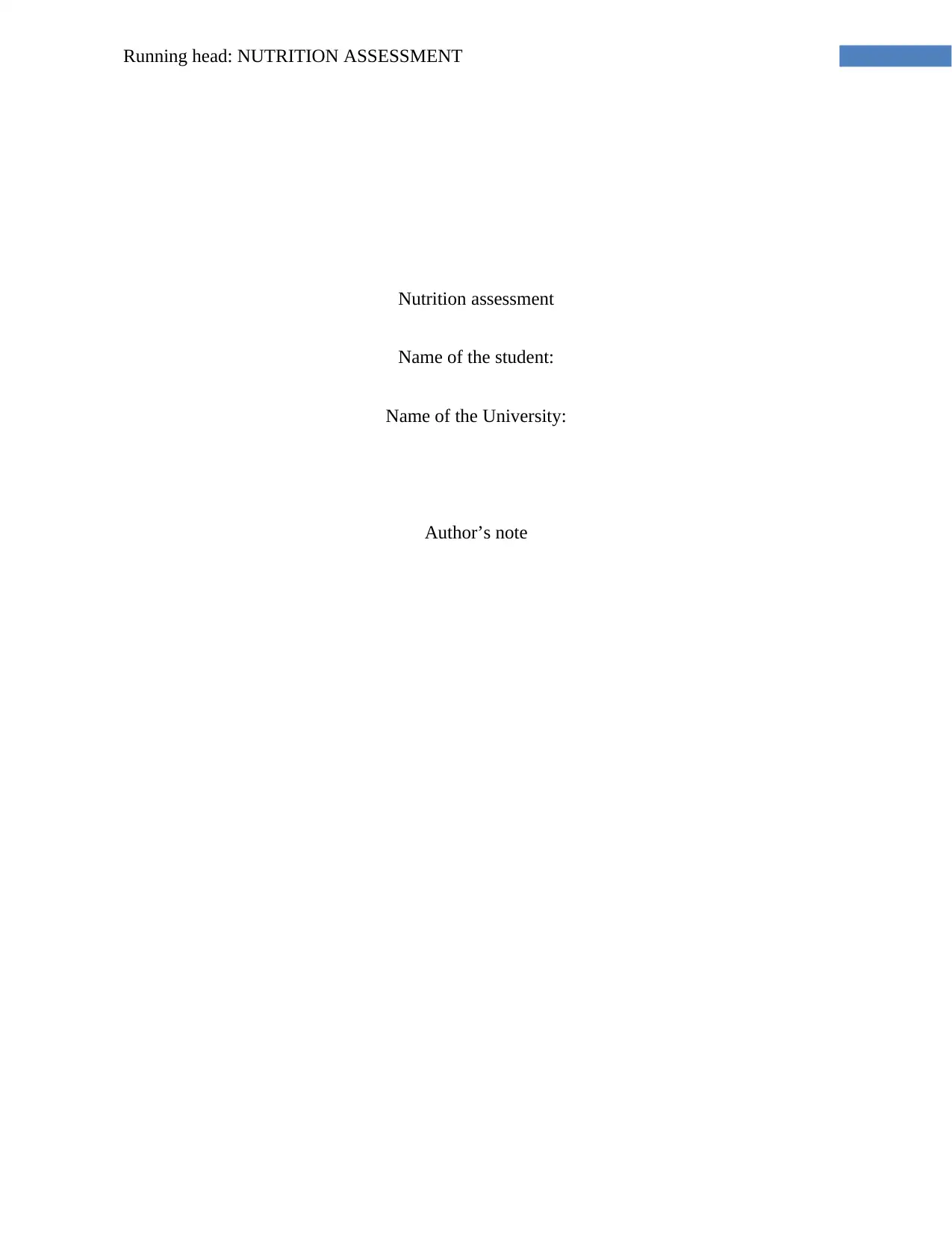
Running head: NUTRITION ASSESSMENT
Nutrition assessment
Name of the student:
Name of the University:
Author’s note
Nutrition assessment
Name of the student:
Name of the University:
Author’s note
Secure Best Marks with AI Grader
Need help grading? Try our AI Grader for instant feedback on your assignments.
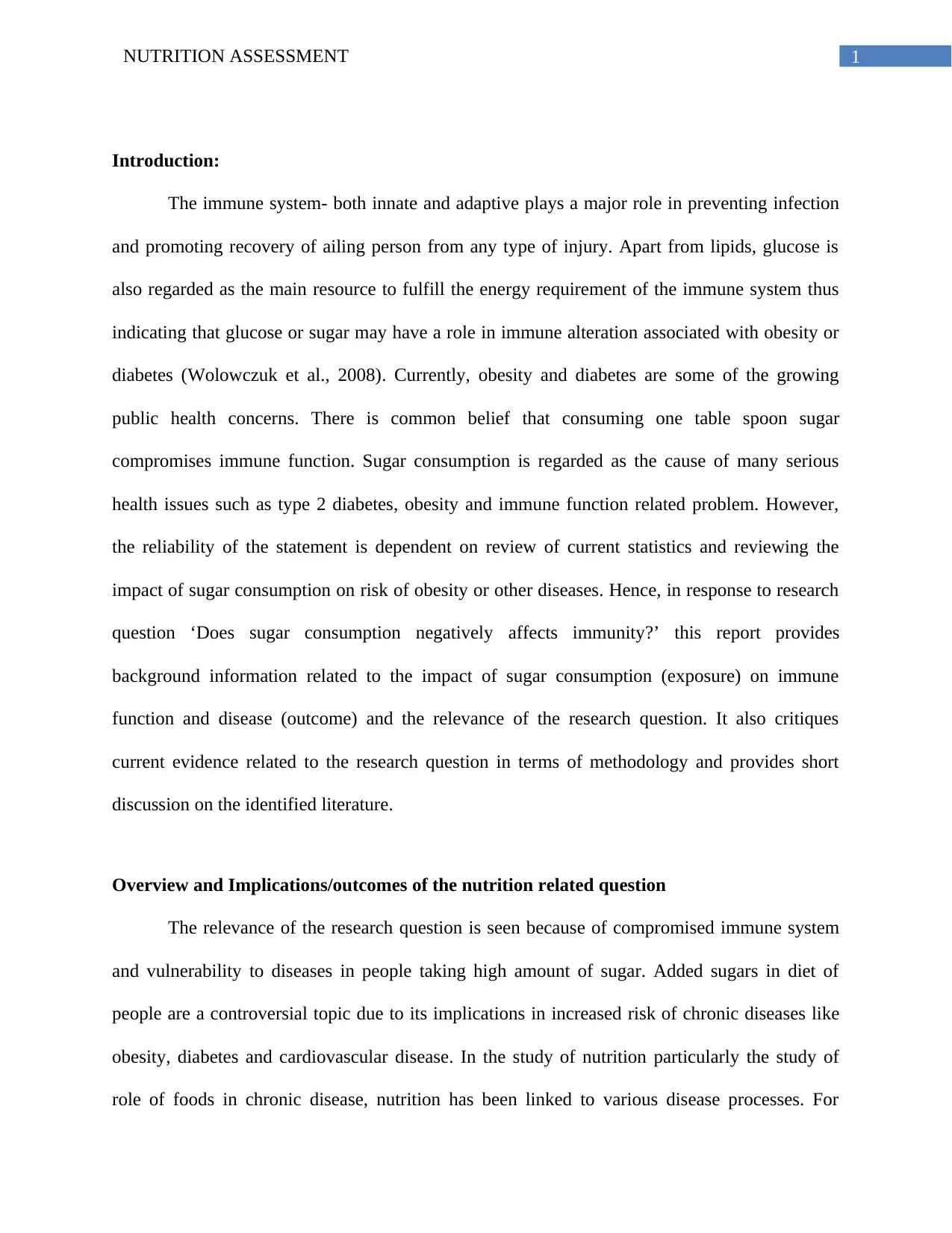
1NUTRITION ASSESSMENT
Introduction:
The immune system- both innate and adaptive plays a major role in preventing infection
and promoting recovery of ailing person from any type of injury. Apart from lipids, glucose is
also regarded as the main resource to fulfill the energy requirement of the immune system thus
indicating that glucose or sugar may have a role in immune alteration associated with obesity or
diabetes (Wolowczuk et al., 2008). Currently, obesity and diabetes are some of the growing
public health concerns. There is common belief that consuming one table spoon sugar
compromises immune function. Sugar consumption is regarded as the cause of many serious
health issues such as type 2 diabetes, obesity and immune function related problem. However,
the reliability of the statement is dependent on review of current statistics and reviewing the
impact of sugar consumption on risk of obesity or other diseases. Hence, in response to research
question ‘Does sugar consumption negatively affects immunity?’ this report provides
background information related to the impact of sugar consumption (exposure) on immune
function and disease (outcome) and the relevance of the research question. It also critiques
current evidence related to the research question in terms of methodology and provides short
discussion on the identified literature.
Overview and Implications/outcomes of the nutrition related question
The relevance of the research question is seen because of compromised immune system
and vulnerability to diseases in people taking high amount of sugar. Added sugars in diet of
people are a controversial topic due to its implications in increased risk of chronic diseases like
obesity, diabetes and cardiovascular disease. In the study of nutrition particularly the study of
role of foods in chronic disease, nutrition has been linked to various disease processes. For
Introduction:
The immune system- both innate and adaptive plays a major role in preventing infection
and promoting recovery of ailing person from any type of injury. Apart from lipids, glucose is
also regarded as the main resource to fulfill the energy requirement of the immune system thus
indicating that glucose or sugar may have a role in immune alteration associated with obesity or
diabetes (Wolowczuk et al., 2008). Currently, obesity and diabetes are some of the growing
public health concerns. There is common belief that consuming one table spoon sugar
compromises immune function. Sugar consumption is regarded as the cause of many serious
health issues such as type 2 diabetes, obesity and immune function related problem. However,
the reliability of the statement is dependent on review of current statistics and reviewing the
impact of sugar consumption on risk of obesity or other diseases. Hence, in response to research
question ‘Does sugar consumption negatively affects immunity?’ this report provides
background information related to the impact of sugar consumption (exposure) on immune
function and disease (outcome) and the relevance of the research question. It also critiques
current evidence related to the research question in terms of methodology and provides short
discussion on the identified literature.
Overview and Implications/outcomes of the nutrition related question
The relevance of the research question is seen because of compromised immune system
and vulnerability to diseases in people taking high amount of sugar. Added sugars in diet of
people are a controversial topic due to its implications in increased risk of chronic diseases like
obesity, diabetes and cardiovascular disease. In the study of nutrition particularly the study of
role of foods in chronic disease, nutrition has been linked to various disease processes. For
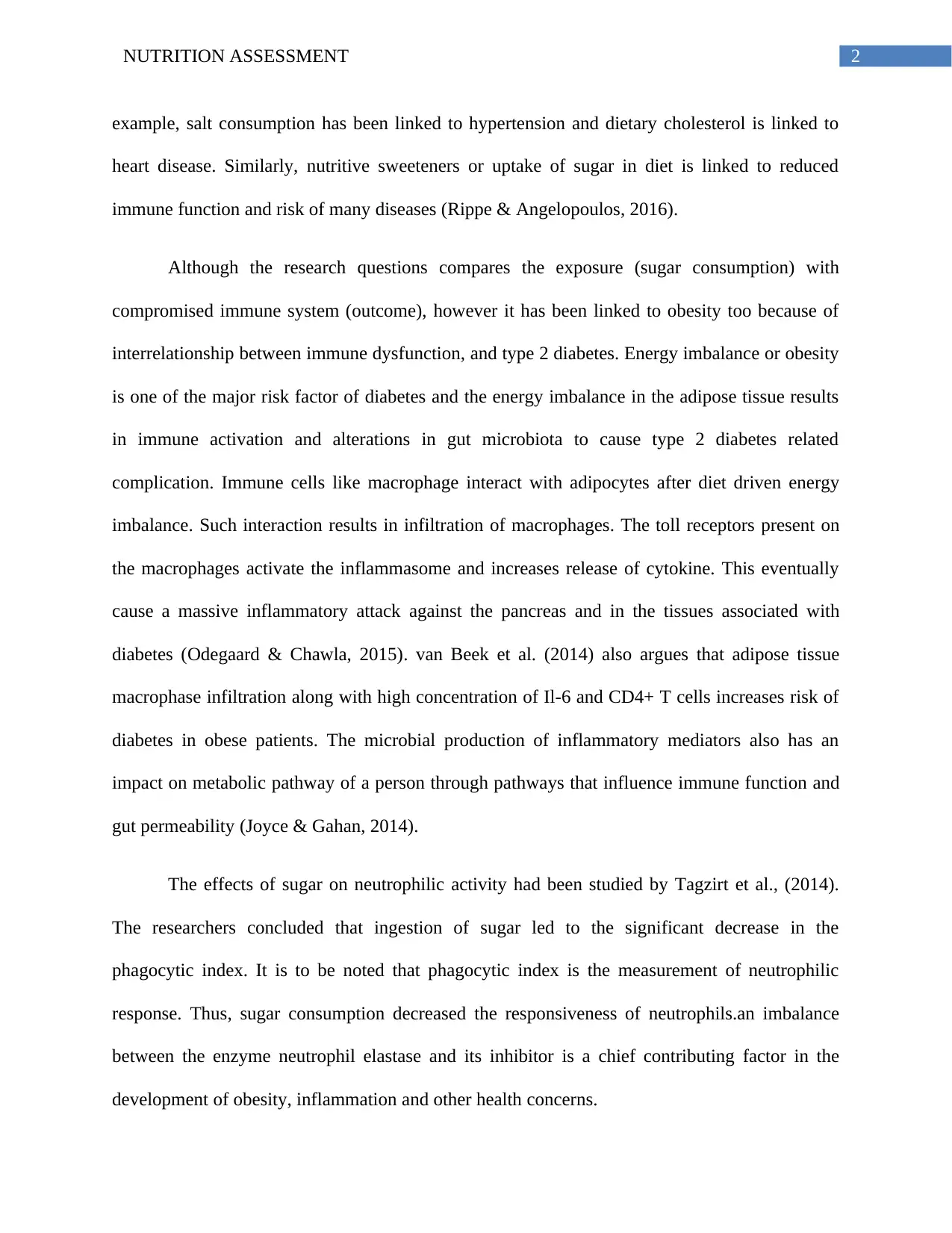
2NUTRITION ASSESSMENT
example, salt consumption has been linked to hypertension and dietary cholesterol is linked to
heart disease. Similarly, nutritive sweeteners or uptake of sugar in diet is linked to reduced
immune function and risk of many diseases (Rippe & Angelopoulos, 2016).
Although the research questions compares the exposure (sugar consumption) with
compromised immune system (outcome), however it has been linked to obesity too because of
interrelationship between immune dysfunction, and type 2 diabetes. Energy imbalance or obesity
is one of the major risk factor of diabetes and the energy imbalance in the adipose tissue results
in immune activation and alterations in gut microbiota to cause type 2 diabetes related
complication. Immune cells like macrophage interact with adipocytes after diet driven energy
imbalance. Such interaction results in infiltration of macrophages. The toll receptors present on
the macrophages activate the inflammasome and increases release of cytokine. This eventually
cause a massive inflammatory attack against the pancreas and in the tissues associated with
diabetes (Odegaard & Chawla, 2015). van Beek et al. (2014) also argues that adipose tissue
macrophase infiltration along with high concentration of Il-6 and CD4+ T cells increases risk of
diabetes in obese patients. The microbial production of inflammatory mediators also has an
impact on metabolic pathway of a person through pathways that influence immune function and
gut permeability (Joyce & Gahan, 2014).
The effects of sugar on neutrophilic activity had been studied by Tagzirt et al., (2014).
The researchers concluded that ingestion of sugar led to the significant decrease in the
phagocytic index. It is to be noted that phagocytic index is the measurement of neutrophilic
response. Thus, sugar consumption decreased the responsiveness of neutrophils.an imbalance
between the enzyme neutrophil elastase and its inhibitor is a chief contributing factor in the
development of obesity, inflammation and other health concerns.
example, salt consumption has been linked to hypertension and dietary cholesterol is linked to
heart disease. Similarly, nutritive sweeteners or uptake of sugar in diet is linked to reduced
immune function and risk of many diseases (Rippe & Angelopoulos, 2016).
Although the research questions compares the exposure (sugar consumption) with
compromised immune system (outcome), however it has been linked to obesity too because of
interrelationship between immune dysfunction, and type 2 diabetes. Energy imbalance or obesity
is one of the major risk factor of diabetes and the energy imbalance in the adipose tissue results
in immune activation and alterations in gut microbiota to cause type 2 diabetes related
complication. Immune cells like macrophage interact with adipocytes after diet driven energy
imbalance. Such interaction results in infiltration of macrophages. The toll receptors present on
the macrophages activate the inflammasome and increases release of cytokine. This eventually
cause a massive inflammatory attack against the pancreas and in the tissues associated with
diabetes (Odegaard & Chawla, 2015). van Beek et al. (2014) also argues that adipose tissue
macrophase infiltration along with high concentration of Il-6 and CD4+ T cells increases risk of
diabetes in obese patients. The microbial production of inflammatory mediators also has an
impact on metabolic pathway of a person through pathways that influence immune function and
gut permeability (Joyce & Gahan, 2014).
The effects of sugar on neutrophilic activity had been studied by Tagzirt et al., (2014).
The researchers concluded that ingestion of sugar led to the significant decrease in the
phagocytic index. It is to be noted that phagocytic index is the measurement of neutrophilic
response. Thus, sugar consumption decreased the responsiveness of neutrophils.an imbalance
between the enzyme neutrophil elastase and its inhibitor is a chief contributing factor in the
development of obesity, inflammation and other health concerns.
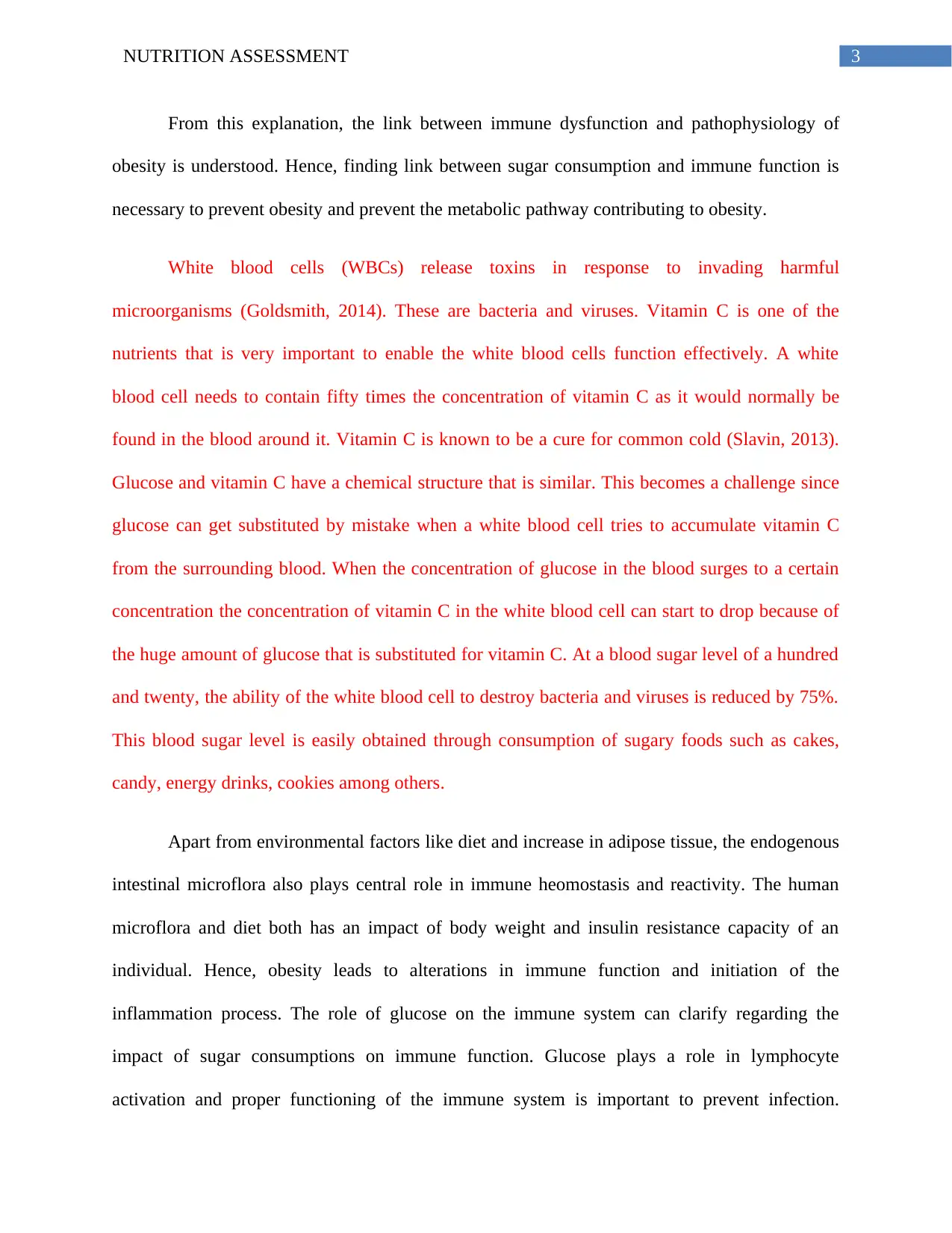
3NUTRITION ASSESSMENT
From this explanation, the link between immune dysfunction and pathophysiology of
obesity is understood. Hence, finding link between sugar consumption and immune function is
necessary to prevent obesity and prevent the metabolic pathway contributing to obesity.
White blood cells (WBCs) release toxins in response to invading harmful
microorganisms (Goldsmith, 2014). These are bacteria and viruses. Vitamin C is one of the
nutrients that is very important to enable the white blood cells function effectively. A white
blood cell needs to contain fifty times the concentration of vitamin C as it would normally be
found in the blood around it. Vitamin C is known to be a cure for common cold (Slavin, 2013).
Glucose and vitamin C have a chemical structure that is similar. This becomes a challenge since
glucose can get substituted by mistake when a white blood cell tries to accumulate vitamin C
from the surrounding blood. When the concentration of glucose in the blood surges to a certain
concentration the concentration of vitamin C in the white blood cell can start to drop because of
the huge amount of glucose that is substituted for vitamin C. At a blood sugar level of a hundred
and twenty, the ability of the white blood cell to destroy bacteria and viruses is reduced by 75%.
This blood sugar level is easily obtained through consumption of sugary foods such as cakes,
candy, energy drinks, cookies among others.
Apart from environmental factors like diet and increase in adipose tissue, the endogenous
intestinal microflora also plays central role in immune heomostasis and reactivity. The human
microflora and diet both has an impact of body weight and insulin resistance capacity of an
individual. Hence, obesity leads to alterations in immune function and initiation of the
inflammation process. The role of glucose on the immune system can clarify regarding the
impact of sugar consumptions on immune function. Glucose plays a role in lymphocyte
activation and proper functioning of the immune system is important to prevent infection.
From this explanation, the link between immune dysfunction and pathophysiology of
obesity is understood. Hence, finding link between sugar consumption and immune function is
necessary to prevent obesity and prevent the metabolic pathway contributing to obesity.
White blood cells (WBCs) release toxins in response to invading harmful
microorganisms (Goldsmith, 2014). These are bacteria and viruses. Vitamin C is one of the
nutrients that is very important to enable the white blood cells function effectively. A white
blood cell needs to contain fifty times the concentration of vitamin C as it would normally be
found in the blood around it. Vitamin C is known to be a cure for common cold (Slavin, 2013).
Glucose and vitamin C have a chemical structure that is similar. This becomes a challenge since
glucose can get substituted by mistake when a white blood cell tries to accumulate vitamin C
from the surrounding blood. When the concentration of glucose in the blood surges to a certain
concentration the concentration of vitamin C in the white blood cell can start to drop because of
the huge amount of glucose that is substituted for vitamin C. At a blood sugar level of a hundred
and twenty, the ability of the white blood cell to destroy bacteria and viruses is reduced by 75%.
This blood sugar level is easily obtained through consumption of sugary foods such as cakes,
candy, energy drinks, cookies among others.
Apart from environmental factors like diet and increase in adipose tissue, the endogenous
intestinal microflora also plays central role in immune heomostasis and reactivity. The human
microflora and diet both has an impact of body weight and insulin resistance capacity of an
individual. Hence, obesity leads to alterations in immune function and initiation of the
inflammation process. The role of glucose on the immune system can clarify regarding the
impact of sugar consumptions on immune function. Glucose plays a role in lymphocyte
activation and proper functioning of the immune system is important to prevent infection.
Secure Best Marks with AI Grader
Need help grading? Try our AI Grader for instant feedback on your assignments.
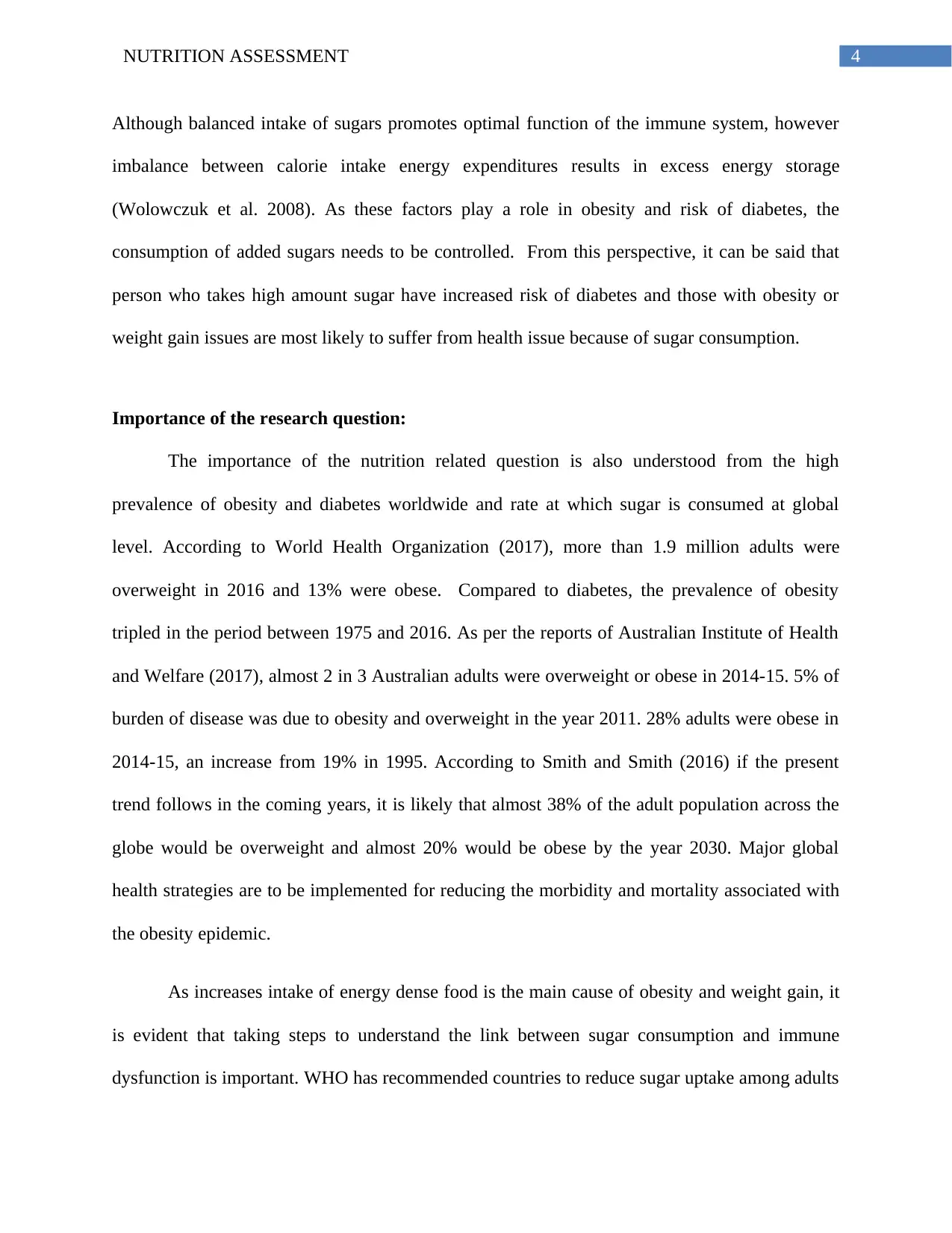
4NUTRITION ASSESSMENT
Although balanced intake of sugars promotes optimal function of the immune system, however
imbalance between calorie intake energy expenditures results in excess energy storage
(Wolowczuk et al. 2008). As these factors play a role in obesity and risk of diabetes, the
consumption of added sugars needs to be controlled. From this perspective, it can be said that
person who takes high amount sugar have increased risk of diabetes and those with obesity or
weight gain issues are most likely to suffer from health issue because of sugar consumption.
Importance of the research question:
The importance of the nutrition related question is also understood from the high
prevalence of obesity and diabetes worldwide and rate at which sugar is consumed at global
level. According to World Health Organization (2017), more than 1.9 million adults were
overweight in 2016 and 13% were obese. Compared to diabetes, the prevalence of obesity
tripled in the period between 1975 and 2016. As per the reports of Australian Institute of Health
and Welfare (2017), almost 2 in 3 Australian adults were overweight or obese in 2014-15. 5% of
burden of disease was due to obesity and overweight in the year 2011. 28% adults were obese in
2014-15, an increase from 19% in 1995. According to Smith and Smith (2016) if the present
trend follows in the coming years, it is likely that almost 38% of the adult population across the
globe would be overweight and almost 20% would be obese by the year 2030. Major global
health strategies are to be implemented for reducing the morbidity and mortality associated with
the obesity epidemic.
As increases intake of energy dense food is the main cause of obesity and weight gain, it
is evident that taking steps to understand the link between sugar consumption and immune
dysfunction is important. WHO has recommended countries to reduce sugar uptake among adults
Although balanced intake of sugars promotes optimal function of the immune system, however
imbalance between calorie intake energy expenditures results in excess energy storage
(Wolowczuk et al. 2008). As these factors play a role in obesity and risk of diabetes, the
consumption of added sugars needs to be controlled. From this perspective, it can be said that
person who takes high amount sugar have increased risk of diabetes and those with obesity or
weight gain issues are most likely to suffer from health issue because of sugar consumption.
Importance of the research question:
The importance of the nutrition related question is also understood from the high
prevalence of obesity and diabetes worldwide and rate at which sugar is consumed at global
level. According to World Health Organization (2017), more than 1.9 million adults were
overweight in 2016 and 13% were obese. Compared to diabetes, the prevalence of obesity
tripled in the period between 1975 and 2016. As per the reports of Australian Institute of Health
and Welfare (2017), almost 2 in 3 Australian adults were overweight or obese in 2014-15. 5% of
burden of disease was due to obesity and overweight in the year 2011. 28% adults were obese in
2014-15, an increase from 19% in 1995. According to Smith and Smith (2016) if the present
trend follows in the coming years, it is likely that almost 38% of the adult population across the
globe would be overweight and almost 20% would be obese by the year 2030. Major global
health strategies are to be implemented for reducing the morbidity and mortality associated with
the obesity epidemic.
As increases intake of energy dense food is the main cause of obesity and weight gain, it
is evident that taking steps to understand the link between sugar consumption and immune
dysfunction is important. WHO has recommended countries to reduce sugar uptake among adults
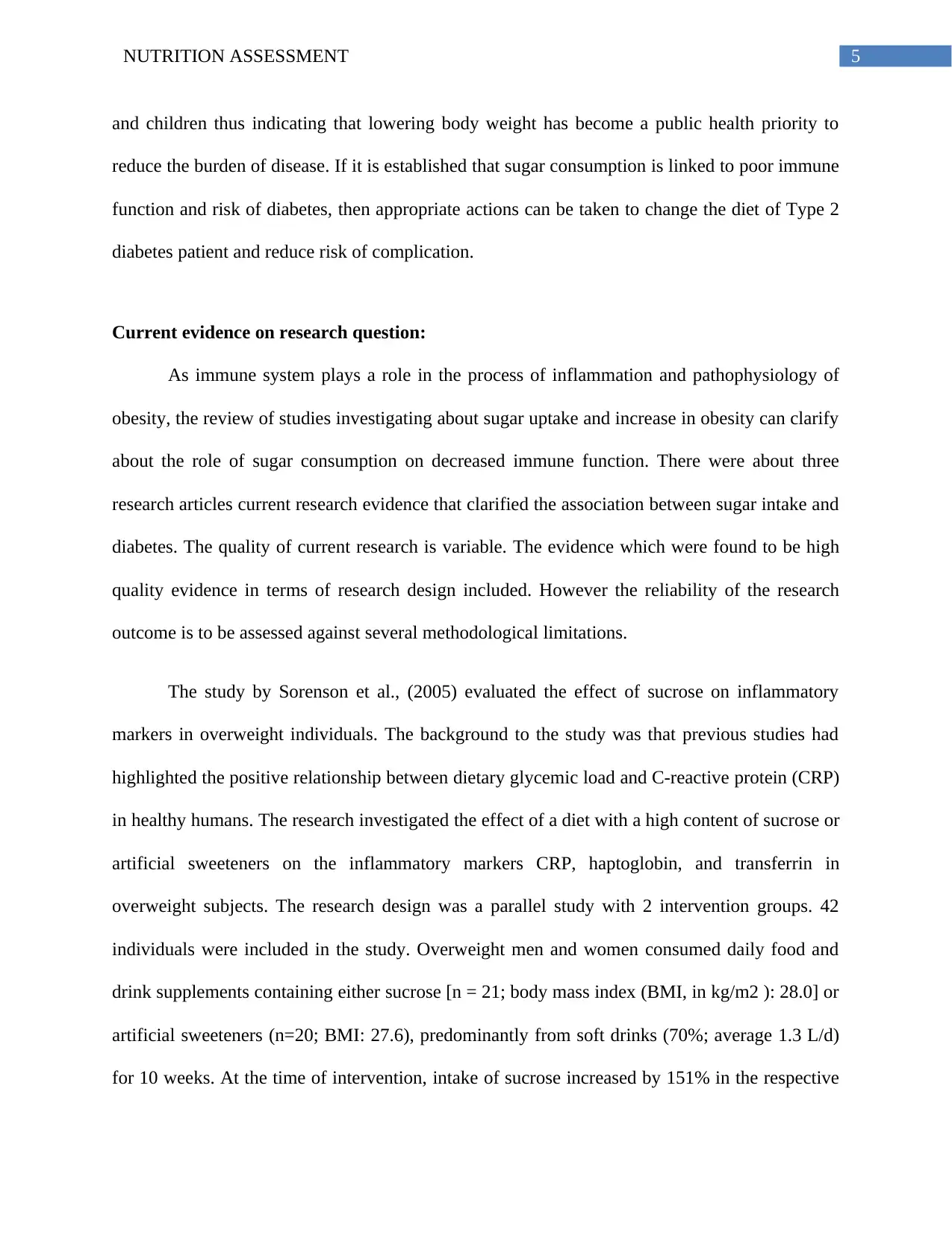
5NUTRITION ASSESSMENT
and children thus indicating that lowering body weight has become a public health priority to
reduce the burden of disease. If it is established that sugar consumption is linked to poor immune
function and risk of diabetes, then appropriate actions can be taken to change the diet of Type 2
diabetes patient and reduce risk of complication.
Current evidence on research question:
As immune system plays a role in the process of inflammation and pathophysiology of
obesity, the review of studies investigating about sugar uptake and increase in obesity can clarify
about the role of sugar consumption on decreased immune function. There were about three
research articles current research evidence that clarified the association between sugar intake and
diabetes. The quality of current research is variable. The evidence which were found to be high
quality evidence in terms of research design included. However the reliability of the research
outcome is to be assessed against several methodological limitations.
The study by Sorenson et al., (2005) evaluated the effect of sucrose on inflammatory
markers in overweight individuals. The background to the study was that previous studies had
highlighted the positive relationship between dietary glycemic load and C-reactive protein (CRP)
in healthy humans. The research investigated the effect of a diet with a high content of sucrose or
artificial sweeteners on the inflammatory markers CRP, haptoglobin, and transferrin in
overweight subjects. The research design was a parallel study with 2 intervention groups. 42
individuals were included in the study. Overweight men and women consumed daily food and
drink supplements containing either sucrose [n = 21; body mass index (BMI, in kg/m2 ): 28.0] or
artificial sweeteners (n=20; BMI: 27.6), predominantly from soft drinks (70%; average 1.3 L/d)
for 10 weeks. At the time of intervention, intake of sucrose increased by 151% in the respective
and children thus indicating that lowering body weight has become a public health priority to
reduce the burden of disease. If it is established that sugar consumption is linked to poor immune
function and risk of diabetes, then appropriate actions can be taken to change the diet of Type 2
diabetes patient and reduce risk of complication.
Current evidence on research question:
As immune system plays a role in the process of inflammation and pathophysiology of
obesity, the review of studies investigating about sugar uptake and increase in obesity can clarify
about the role of sugar consumption on decreased immune function. There were about three
research articles current research evidence that clarified the association between sugar intake and
diabetes. The quality of current research is variable. The evidence which were found to be high
quality evidence in terms of research design included. However the reliability of the research
outcome is to be assessed against several methodological limitations.
The study by Sorenson et al., (2005) evaluated the effect of sucrose on inflammatory
markers in overweight individuals. The background to the study was that previous studies had
highlighted the positive relationship between dietary glycemic load and C-reactive protein (CRP)
in healthy humans. The research investigated the effect of a diet with a high content of sucrose or
artificial sweeteners on the inflammatory markers CRP, haptoglobin, and transferrin in
overweight subjects. The research design was a parallel study with 2 intervention groups. 42
individuals were included in the study. Overweight men and women consumed daily food and
drink supplements containing either sucrose [n = 21; body mass index (BMI, in kg/m2 ): 28.0] or
artificial sweeteners (n=20; BMI: 27.6), predominantly from soft drinks (70%; average 1.3 L/d)
for 10 weeks. At the time of intervention, intake of sucrose increased by 151% in the respective
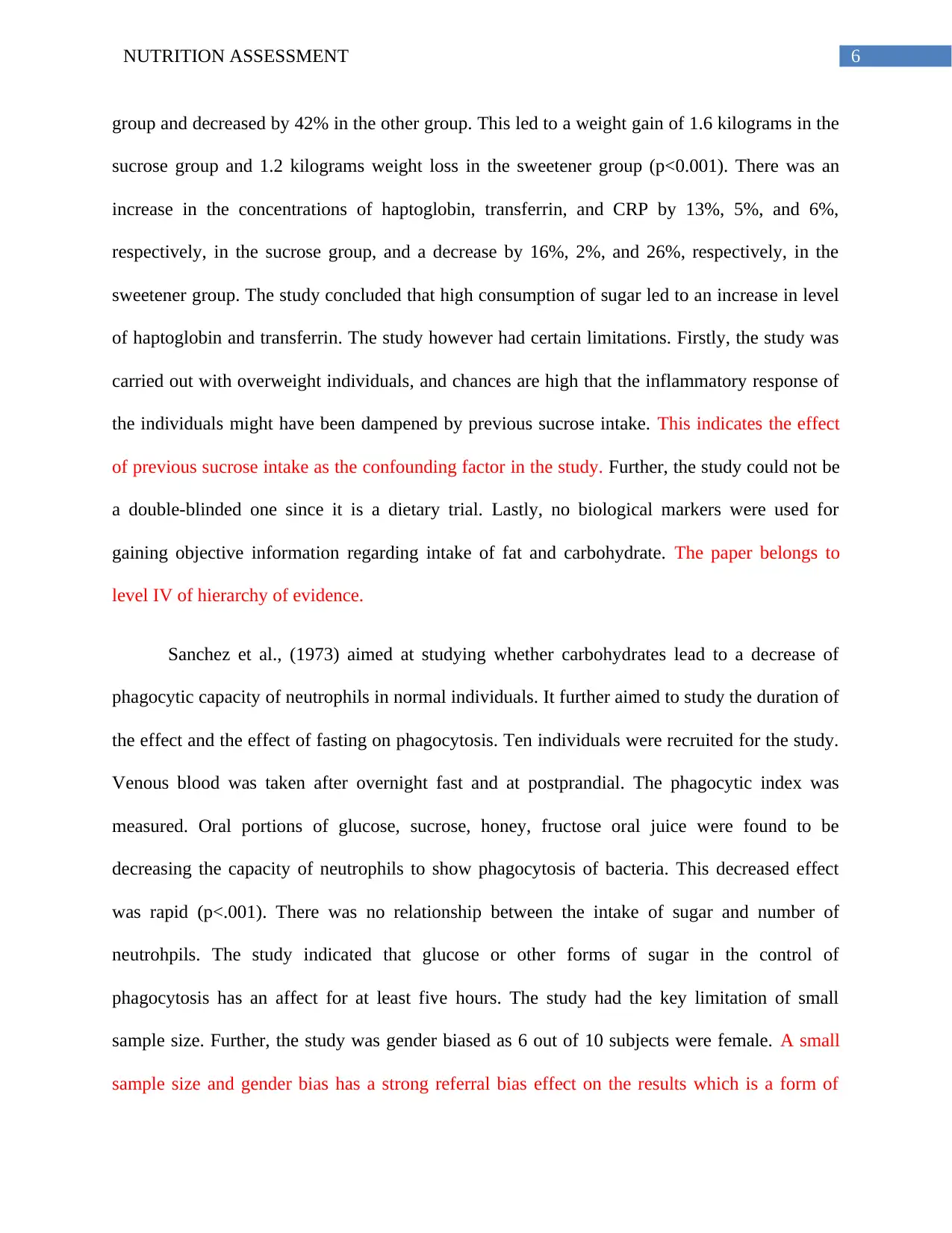
6NUTRITION ASSESSMENT
group and decreased by 42% in the other group. This led to a weight gain of 1.6 kilograms in the
sucrose group and 1.2 kilograms weight loss in the sweetener group (p<0.001). There was an
increase in the concentrations of haptoglobin, transferrin, and CRP by 13%, 5%, and 6%,
respectively, in the sucrose group, and a decrease by 16%, 2%, and 26%, respectively, in the
sweetener group. The study concluded that high consumption of sugar led to an increase in level
of haptoglobin and transferrin. The study however had certain limitations. Firstly, the study was
carried out with overweight individuals, and chances are high that the inflammatory response of
the individuals might have been dampened by previous sucrose intake. This indicates the effect
of previous sucrose intake as the confounding factor in the study. Further, the study could not be
a double-blinded one since it is a dietary trial. Lastly, no biological markers were used for
gaining objective information regarding intake of fat and carbohydrate. The paper belongs to
level IV of hierarchy of evidence.
Sanchez et al., (1973) aimed at studying whether carbohydrates lead to a decrease of
phagocytic capacity of neutrophils in normal individuals. It further aimed to study the duration of
the effect and the effect of fasting on phagocytosis. Ten individuals were recruited for the study.
Venous blood was taken after overnight fast and at postprandial. The phagocytic index was
measured. Oral portions of glucose, sucrose, honey, fructose oral juice were found to be
decreasing the capacity of neutrophils to show phagocytosis of bacteria. This decreased effect
was rapid (p<.001). There was no relationship between the intake of sugar and number of
neutrohpils. The study indicated that glucose or other forms of sugar in the control of
phagocytosis has an affect for at least five hours. The study had the key limitation of small
sample size. Further, the study was gender biased as 6 out of 10 subjects were female. A small
sample size and gender bias has a strong referral bias effect on the results which is a form of
group and decreased by 42% in the other group. This led to a weight gain of 1.6 kilograms in the
sucrose group and 1.2 kilograms weight loss in the sweetener group (p<0.001). There was an
increase in the concentrations of haptoglobin, transferrin, and CRP by 13%, 5%, and 6%,
respectively, in the sucrose group, and a decrease by 16%, 2%, and 26%, respectively, in the
sweetener group. The study concluded that high consumption of sugar led to an increase in level
of haptoglobin and transferrin. The study however had certain limitations. Firstly, the study was
carried out with overweight individuals, and chances are high that the inflammatory response of
the individuals might have been dampened by previous sucrose intake. This indicates the effect
of previous sucrose intake as the confounding factor in the study. Further, the study could not be
a double-blinded one since it is a dietary trial. Lastly, no biological markers were used for
gaining objective information regarding intake of fat and carbohydrate. The paper belongs to
level IV of hierarchy of evidence.
Sanchez et al., (1973) aimed at studying whether carbohydrates lead to a decrease of
phagocytic capacity of neutrophils in normal individuals. It further aimed to study the duration of
the effect and the effect of fasting on phagocytosis. Ten individuals were recruited for the study.
Venous blood was taken after overnight fast and at postprandial. The phagocytic index was
measured. Oral portions of glucose, sucrose, honey, fructose oral juice were found to be
decreasing the capacity of neutrophils to show phagocytosis of bacteria. This decreased effect
was rapid (p<.001). There was no relationship between the intake of sugar and number of
neutrohpils. The study indicated that glucose or other forms of sugar in the control of
phagocytosis has an affect for at least five hours. The study had the key limitation of small
sample size. Further, the study was gender biased as 6 out of 10 subjects were female. A small
sample size and gender bias has a strong referral bias effect on the results which is a form of
Paraphrase This Document
Need a fresh take? Get an instant paraphrase of this document with our AI Paraphraser
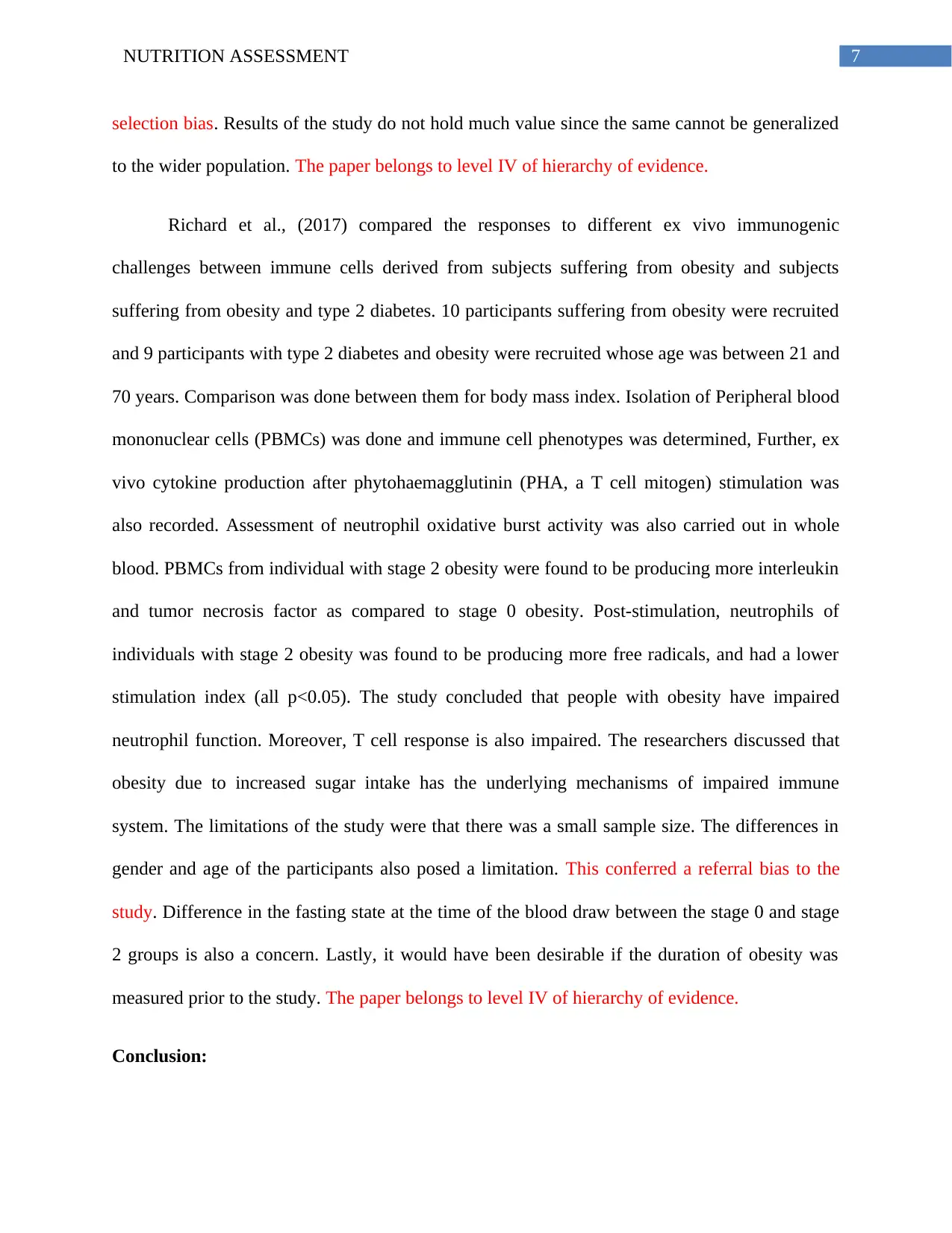
7NUTRITION ASSESSMENT
selection bias. Results of the study do not hold much value since the same cannot be generalized
to the wider population. The paper belongs to level IV of hierarchy of evidence.
Richard et al., (2017) compared the responses to different ex vivo immunogenic
challenges between immune cells derived from subjects suffering from obesity and subjects
suffering from obesity and type 2 diabetes. 10 participants suffering from obesity were recruited
and 9 participants with type 2 diabetes and obesity were recruited whose age was between 21 and
70 years. Comparison was done between them for body mass index. Isolation of Peripheral blood
mononuclear cells (PBMCs) was done and immune cell phenotypes was determined, Further, ex
vivo cytokine production after phytohaemagglutinin (PHA, a T cell mitogen) stimulation was
also recorded. Assessment of neutrophil oxidative burst activity was also carried out in whole
blood. PBMCs from individual with stage 2 obesity were found to be producing more interleukin
and tumor necrosis factor as compared to stage 0 obesity. Post-stimulation, neutrophils of
individuals with stage 2 obesity was found to be producing more free radicals, and had a lower
stimulation index (all p<0.05). The study concluded that people with obesity have impaired
neutrophil function. Moreover, T cell response is also impaired. The researchers discussed that
obesity due to increased sugar intake has the underlying mechanisms of impaired immune
system. The limitations of the study were that there was a small sample size. The differences in
gender and age of the participants also posed a limitation. This conferred a referral bias to the
study. Difference in the fasting state at the time of the blood draw between the stage 0 and stage
2 groups is also a concern. Lastly, it would have been desirable if the duration of obesity was
measured prior to the study. The paper belongs to level IV of hierarchy of evidence.
Conclusion:
selection bias. Results of the study do not hold much value since the same cannot be generalized
to the wider population. The paper belongs to level IV of hierarchy of evidence.
Richard et al., (2017) compared the responses to different ex vivo immunogenic
challenges between immune cells derived from subjects suffering from obesity and subjects
suffering from obesity and type 2 diabetes. 10 participants suffering from obesity were recruited
and 9 participants with type 2 diabetes and obesity were recruited whose age was between 21 and
70 years. Comparison was done between them for body mass index. Isolation of Peripheral blood
mononuclear cells (PBMCs) was done and immune cell phenotypes was determined, Further, ex
vivo cytokine production after phytohaemagglutinin (PHA, a T cell mitogen) stimulation was
also recorded. Assessment of neutrophil oxidative burst activity was also carried out in whole
blood. PBMCs from individual with stage 2 obesity were found to be producing more interleukin
and tumor necrosis factor as compared to stage 0 obesity. Post-stimulation, neutrophils of
individuals with stage 2 obesity was found to be producing more free radicals, and had a lower
stimulation index (all p<0.05). The study concluded that people with obesity have impaired
neutrophil function. Moreover, T cell response is also impaired. The researchers discussed that
obesity due to increased sugar intake has the underlying mechanisms of impaired immune
system. The limitations of the study were that there was a small sample size. The differences in
gender and age of the participants also posed a limitation. This conferred a referral bias to the
study. Difference in the fasting state at the time of the blood draw between the stage 0 and stage
2 groups is also a concern. Lastly, it would have been desirable if the duration of obesity was
measured prior to the study. The paper belongs to level IV of hierarchy of evidence.
Conclusion:
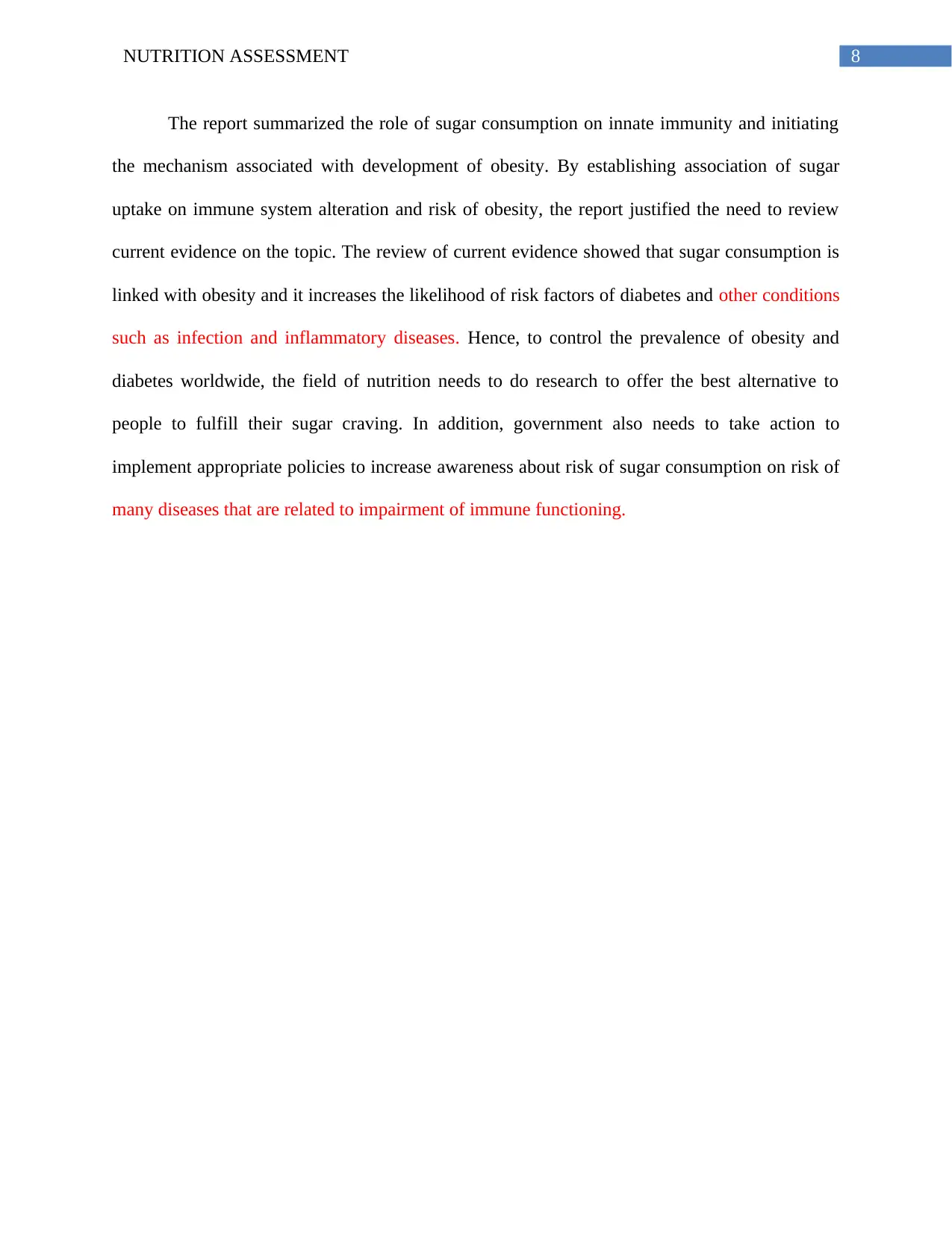
8NUTRITION ASSESSMENT
The report summarized the role of sugar consumption on innate immunity and initiating
the mechanism associated with development of obesity. By establishing association of sugar
uptake on immune system alteration and risk of obesity, the report justified the need to review
current evidence on the topic. The review of current evidence showed that sugar consumption is
linked with obesity and it increases the likelihood of risk factors of diabetes and other conditions
such as infection and inflammatory diseases. Hence, to control the prevalence of obesity and
diabetes worldwide, the field of nutrition needs to do research to offer the best alternative to
people to fulfill their sugar craving. In addition, government also needs to take action to
implement appropriate policies to increase awareness about risk of sugar consumption on risk of
many diseases that are related to impairment of immune functioning.
The report summarized the role of sugar consumption on innate immunity and initiating
the mechanism associated with development of obesity. By establishing association of sugar
uptake on immune system alteration and risk of obesity, the report justified the need to review
current evidence on the topic. The review of current evidence showed that sugar consumption is
linked with obesity and it increases the likelihood of risk factors of diabetes and other conditions
such as infection and inflammatory diseases. Hence, to control the prevalence of obesity and
diabetes worldwide, the field of nutrition needs to do research to offer the best alternative to
people to fulfill their sugar craving. In addition, government also needs to take action to
implement appropriate policies to increase awareness about risk of sugar consumption on risk of
many diseases that are related to impairment of immune functioning.
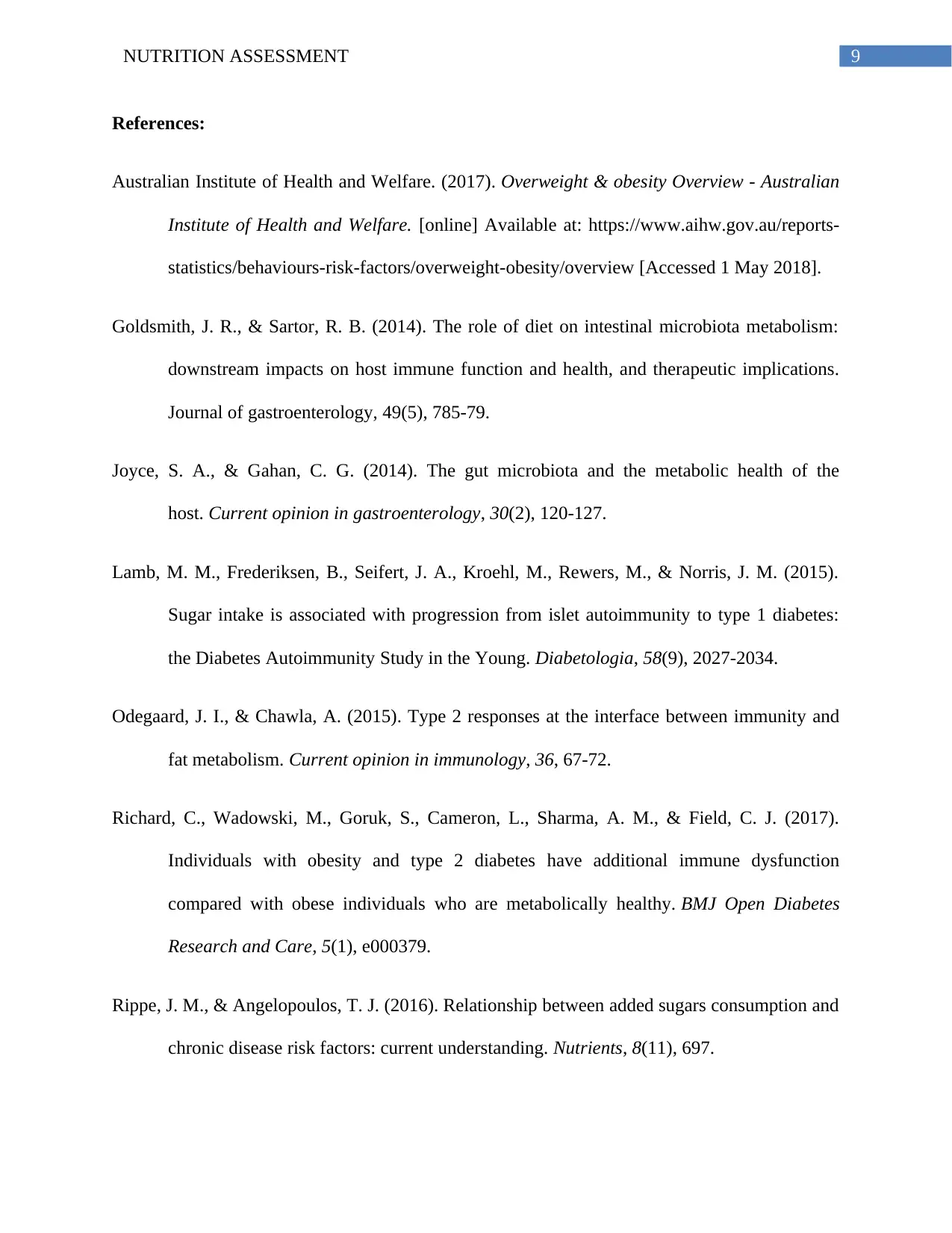
9NUTRITION ASSESSMENT
References:
Australian Institute of Health and Welfare. (2017). Overweight & obesity Overview - Australian
Institute of Health and Welfare. [online] Available at: https://www.aihw.gov.au/reports-
statistics/behaviours-risk-factors/overweight-obesity/overview [Accessed 1 May 2018].
Goldsmith, J. R., & Sartor, R. B. (2014). The role of diet on intestinal microbiota metabolism:
downstream impacts on host immune function and health, and therapeutic implications.
Journal of gastroenterology, 49(5), 785-79.
Joyce, S. A., & Gahan, C. G. (2014). The gut microbiota and the metabolic health of the
host. Current opinion in gastroenterology, 30(2), 120-127.
Lamb, M. M., Frederiksen, B., Seifert, J. A., Kroehl, M., Rewers, M., & Norris, J. M. (2015).
Sugar intake is associated with progression from islet autoimmunity to type 1 diabetes:
the Diabetes Autoimmunity Study in the Young. Diabetologia, 58(9), 2027-2034.
Odegaard, J. I., & Chawla, A. (2015). Type 2 responses at the interface between immunity and
fat metabolism. Current opinion in immunology, 36, 67-72.
Richard, C., Wadowski, M., Goruk, S., Cameron, L., Sharma, A. M., & Field, C. J. (2017).
Individuals with obesity and type 2 diabetes have additional immune dysfunction
compared with obese individuals who are metabolically healthy. BMJ Open Diabetes
Research and Care, 5(1), e000379.
Rippe, J. M., & Angelopoulos, T. J. (2016). Relationship between added sugars consumption and
chronic disease risk factors: current understanding. Nutrients, 8(11), 697.
References:
Australian Institute of Health and Welfare. (2017). Overweight & obesity Overview - Australian
Institute of Health and Welfare. [online] Available at: https://www.aihw.gov.au/reports-
statistics/behaviours-risk-factors/overweight-obesity/overview [Accessed 1 May 2018].
Goldsmith, J. R., & Sartor, R. B. (2014). The role of diet on intestinal microbiota metabolism:
downstream impacts on host immune function and health, and therapeutic implications.
Journal of gastroenterology, 49(5), 785-79.
Joyce, S. A., & Gahan, C. G. (2014). The gut microbiota and the metabolic health of the
host. Current opinion in gastroenterology, 30(2), 120-127.
Lamb, M. M., Frederiksen, B., Seifert, J. A., Kroehl, M., Rewers, M., & Norris, J. M. (2015).
Sugar intake is associated with progression from islet autoimmunity to type 1 diabetes:
the Diabetes Autoimmunity Study in the Young. Diabetologia, 58(9), 2027-2034.
Odegaard, J. I., & Chawla, A. (2015). Type 2 responses at the interface between immunity and
fat metabolism. Current opinion in immunology, 36, 67-72.
Richard, C., Wadowski, M., Goruk, S., Cameron, L., Sharma, A. M., & Field, C. J. (2017).
Individuals with obesity and type 2 diabetes have additional immune dysfunction
compared with obese individuals who are metabolically healthy. BMJ Open Diabetes
Research and Care, 5(1), e000379.
Rippe, J. M., & Angelopoulos, T. J. (2016). Relationship between added sugars consumption and
chronic disease risk factors: current understanding. Nutrients, 8(11), 697.
Secure Best Marks with AI Grader
Need help grading? Try our AI Grader for instant feedback on your assignments.
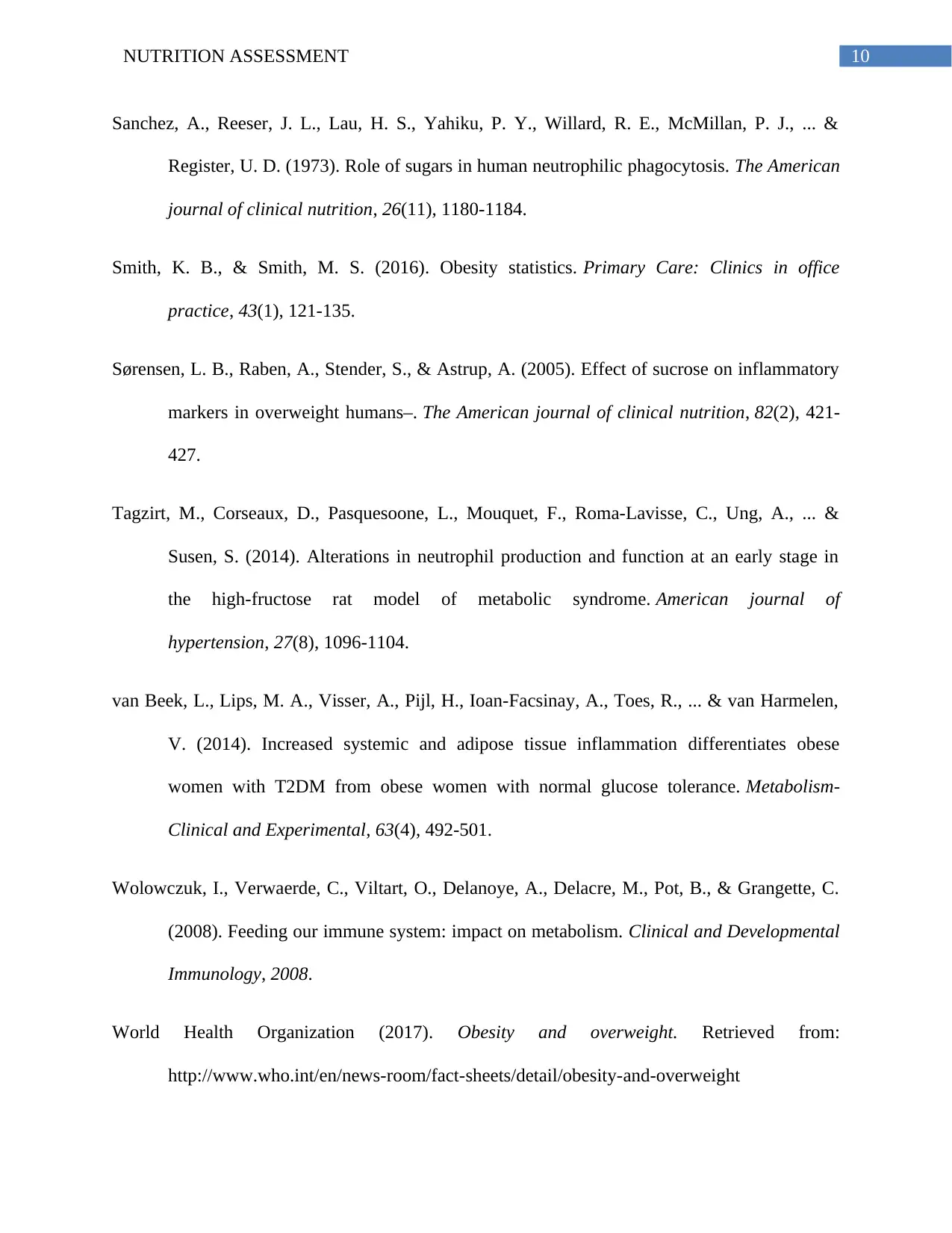
10NUTRITION ASSESSMENT
Sanchez, A., Reeser, J. L., Lau, H. S., Yahiku, P. Y., Willard, R. E., McMillan, P. J., ... &
Register, U. D. (1973). Role of sugars in human neutrophilic phagocytosis. The American
journal of clinical nutrition, 26(11), 1180-1184.
Smith, K. B., & Smith, M. S. (2016). Obesity statistics. Primary Care: Clinics in office
practice, 43(1), 121-135.
Sørensen, L. B., Raben, A., Stender, S., & Astrup, A. (2005). Effect of sucrose on inflammatory
markers in overweight humans–. The American journal of clinical nutrition, 82(2), 421-
427.
Tagzirt, M., Corseaux, D., Pasquesoone, L., Mouquet, F., Roma-Lavisse, C., Ung, A., ... &
Susen, S. (2014). Alterations in neutrophil production and function at an early stage in
the high-fructose rat model of metabolic syndrome. American journal of
hypertension, 27(8), 1096-1104.
van Beek, L., Lips, M. A., Visser, A., Pijl, H., Ioan-Facsinay, A., Toes, R., ... & van Harmelen,
V. (2014). Increased systemic and adipose tissue inflammation differentiates obese
women with T2DM from obese women with normal glucose tolerance. Metabolism-
Clinical and Experimental, 63(4), 492-501.
Wolowczuk, I., Verwaerde, C., Viltart, O., Delanoye, A., Delacre, M., Pot, B., & Grangette, C.
(2008). Feeding our immune system: impact on metabolism. Clinical and Developmental
Immunology, 2008.
World Health Organization (2017). Obesity and overweight. Retrieved from:
http://www.who.int/en/news-room/fact-sheets/detail/obesity-and-overweight
Sanchez, A., Reeser, J. L., Lau, H. S., Yahiku, P. Y., Willard, R. E., McMillan, P. J., ... &
Register, U. D. (1973). Role of sugars in human neutrophilic phagocytosis. The American
journal of clinical nutrition, 26(11), 1180-1184.
Smith, K. B., & Smith, M. S. (2016). Obesity statistics. Primary Care: Clinics in office
practice, 43(1), 121-135.
Sørensen, L. B., Raben, A., Stender, S., & Astrup, A. (2005). Effect of sucrose on inflammatory
markers in overweight humans–. The American journal of clinical nutrition, 82(2), 421-
427.
Tagzirt, M., Corseaux, D., Pasquesoone, L., Mouquet, F., Roma-Lavisse, C., Ung, A., ... &
Susen, S. (2014). Alterations in neutrophil production and function at an early stage in
the high-fructose rat model of metabolic syndrome. American journal of
hypertension, 27(8), 1096-1104.
van Beek, L., Lips, M. A., Visser, A., Pijl, H., Ioan-Facsinay, A., Toes, R., ... & van Harmelen,
V. (2014). Increased systemic and adipose tissue inflammation differentiates obese
women with T2DM from obese women with normal glucose tolerance. Metabolism-
Clinical and Experimental, 63(4), 492-501.
Wolowczuk, I., Verwaerde, C., Viltart, O., Delanoye, A., Delacre, M., Pot, B., & Grangette, C.
(2008). Feeding our immune system: impact on metabolism. Clinical and Developmental
Immunology, 2008.
World Health Organization (2017). Obesity and overweight. Retrieved from:
http://www.who.int/en/news-room/fact-sheets/detail/obesity-and-overweight
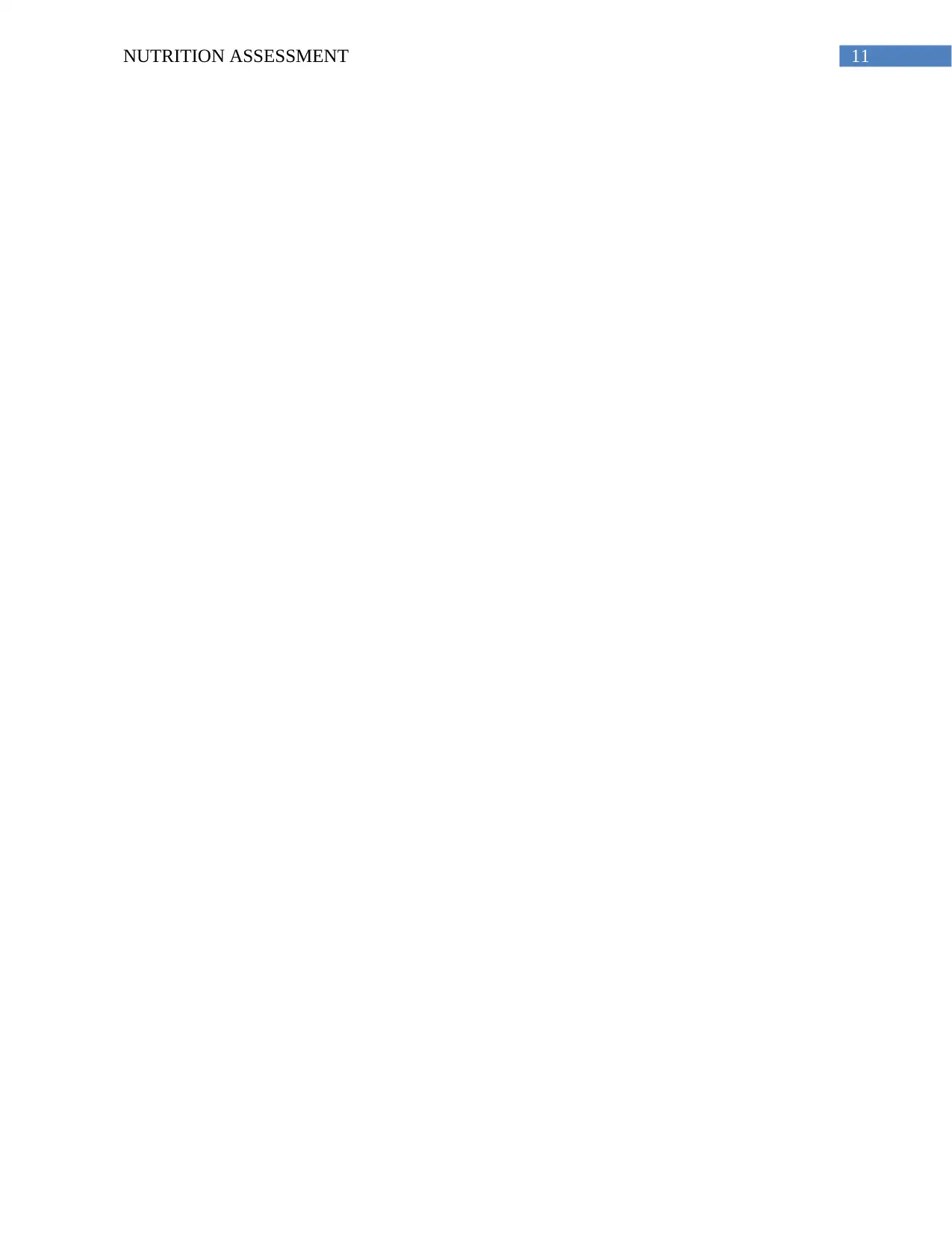
11NUTRITION ASSESSMENT
1 out of 12
Related Documents
Your All-in-One AI-Powered Toolkit for Academic Success.
+13062052269
info@desklib.com
Available 24*7 on WhatsApp / Email
![[object Object]](/_next/static/media/star-bottom.7253800d.svg)
Unlock your academic potential
© 2024 | Zucol Services PVT LTD | All rights reserved.





